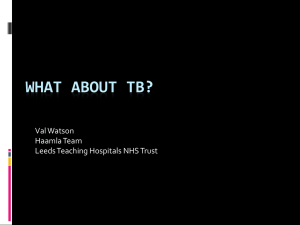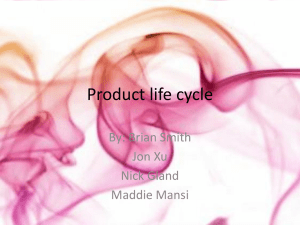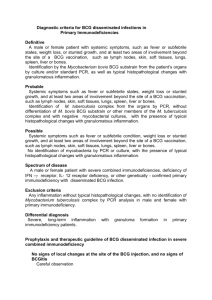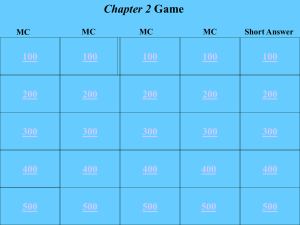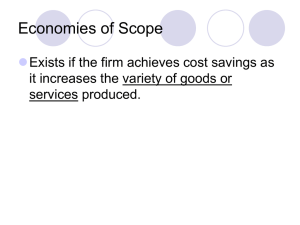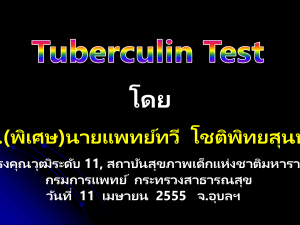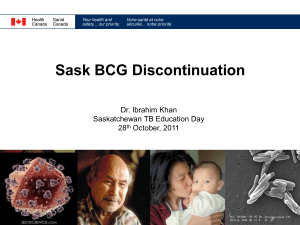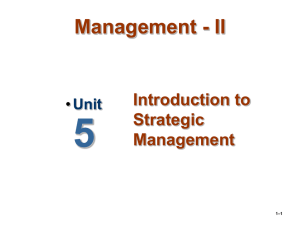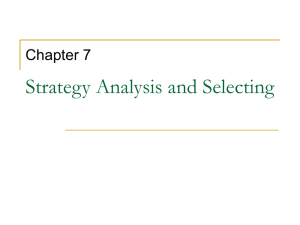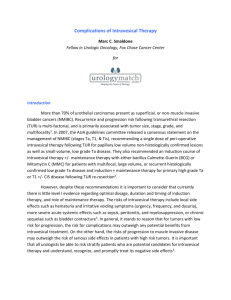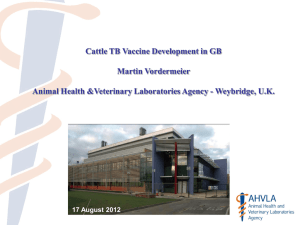PRIME/BOOST - WordPress.com
advertisement
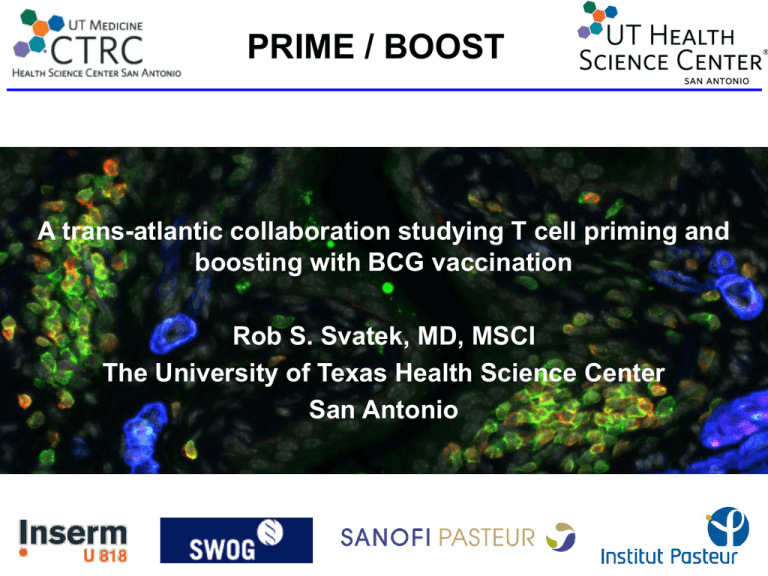
PRIME / BOOST A trans-atlantic collaboration studying T cell priming and boosting with BCG vaccination Rob S. Svatek, MD, MSCI The University of Texas Health Science Center San Antonio Prime/Boost Participants Europe • Cyril Rentsch (University Hospital of Basel, Switzerland) • Matthew Albert (Institut Pasteur, Paris) • George Thallman (Inselspital, Bern, Switzerland) EORTC • Richard Sylvester (Senior Statistician) • Julie Hermans (Operations) Sanofi Pasteur • Andrew Farrow (Director, Franchise Liaison) SAKK • Celine Genton (SAKK) SWOG • Rob Svatek (San Antonio) • Seth Lerner (Houston) • Cathy Tangen (Senior Statistician) BCG adjuvant therapy remains the standard-of-care for high-risk superficial bladder cancer Outer muscle layer Inner muscle layer Lamina propria Papillary tumor Mucosa Carcinoma in situ Prostate gland Urethra surgery BCG 1 wk BCG – something extraordinary…. Carcinoma-in-situ (CIS) Complete Resolution BCG Treatment Induction (6 weeks) Maintenance (3weeks) BCG induction surgery week 1 week 4 BCG maintenance week 6 week 12 Progression-free survival BCG therapy: one of the few examples of successful immunotherapy in the clinic 1.0 0.9 0.8 0.7 surgery + BCG 0.6 0.5 0.4 0.3 0.2 0.1 surgery alone 0.0 0 5 10 15 20 years Superficial cancer (T1G3 stage) Adapted from Herr, 1997 Current proposed model of BCG therapy in bladder cancer BCG tumor cells Bladder urothelium 1 attachment and invasion of the urothelium 4 cytolysis of bladder tumor cells by CD8+ T cells T cells Neutrophils 2 Monocytes attraction of innate immune cells and release of cytokines / chemokines 3 attraction and activation of T cells Adapted from Albert, 2014 BCG adjuvant therapy remains the standard-of-care for high-risk superficial bladder cancer Outer muscle layer Inner muscle layer Lamina propria Papillary tumor Mucosa Carcinoma in situ Prostate gland Urethra surgery BCG 1 wk Boosted cytokines after repeated instillations of BCG surgery BCG week 1 week 4 week 6 PRIME/BOOST Concept Intradermal vaccine prior to intravesical instillation could improve resonse to intravesical BCG MB49 animal model for BCG studies High-resolution ultrasound: Baseline Week 1 BCG Instillation • Dwell time: 2hrs • BCG Dose: – ~ 3 x 106 CFUs per mouse (2% of human dose) BCG Week 1 Week 2 Week 3 s.c. immunization prior to intravesical challenge results in rapid bladder T cell infiltration at 1st intravesical instillation Repeated Weeks 1 to 4 Single Week 1 BCG s.c. * -21 0 * -21 7 14 21 0 Single *0 Week 4 33-35 33-35 21 33-35 Instillation: PBS BCG BCG PBS BCG BCG BCG Week(s) of treatment: W1-4 W1-4 W1 W1-4 W1-4 W1 W4 Ø BCG s.c. 21 days prior to instillation Biot et al. Science Transl Med. 2012 Pre-existing BCG-specific immunity improves anti-tumor response in a mouse model for bladder cancer BCG s.c. * -19 80,000 MB49 (+ poly-L-lysin) 0 Intravesical PBS or BCG 2 9 16 23 30 days BCG s.c. Intravesical ttt + + - BCG (n=9) BCG (n=8) PBS (n=9) PBS (n=8) ** Biot et al. Science Transl Med. 2012 Pre-existing BCG-specific immunity improves anti-tumor response in patients Patients with high-risk bladder tumor Surgery BCG therapy Clinical outcome? PPD test + + + + 100 Recurrence-free survival (%) 90 80 70 + + + ++ + 60 50 + 40 + + + 30 20 + 10 Censored PPD + (n=23) PPD - (n=32) 0 0 10 50 20 30 40 Time until recurrence (months) * 60 Biot et al. Science Transl Med. 2012 PRIME SWOG Trial Schema PRIME/BOOST PRIME –U.S. –PPD negative BOOST –Europe –PPD negative/positive –A significant proportion of European patients are PPD negative, despite childhood vaccination –Stratify – PPD expression PRIME/BOOST Trial Schema Correlative Studies Impact of prime/boost on immune responses – Monitor blood and urine protein biomarkers using multiplexed immunoassays Validate prior models and identify novel molecular determinates of BCG responsiveness • • • Systemic/local immune responses following therapy Urine based Cell-lineage specific gene expression profiles Tissue-based IHC Conclusions PRIME / BOOST A trans-atlantic collaboration studying T cell priming and boosting with BCG vaccination • BCG immunotherapy is effective but currently we have no reliable determinants of therapy response • Intradermal BCG vaccination – a cost-effective means to improve response? • Opportunity for correlative studies
